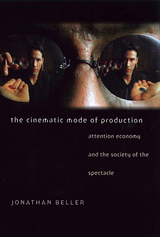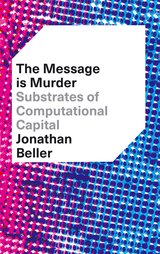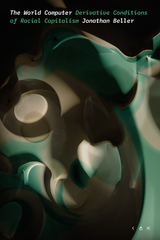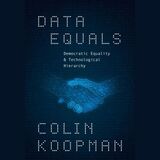3 books about Beller, Jonathan

The Cinematic Mode of Production
Attention Economy and the Society of the Spectacle
Jonathan Beller
Dartmouth College Press, 2006
“Cinema brings the industrial revolution to the eye,” writes Jonathan Beller, “and engages spectators in increasingly dematerialized processes of social production.” In his groundbreaking critical study, cinema is the paradigmatic example of how the act of looking has been construed by capital as “productive labor.” Through an examination of cinema over the course of the twentieth century, Beller establishes on both theoretical and historical grounds the process of the emergent capitalization of perception. This process, he says, underpins the current global economy. By exploring a set of films made since the late 1920s, Beller argues that, through cinema, capital first posits and then presupposes looking as a value-productive activity. He argues that cinema, as the first crystallization of a new order of media, is itself an abstraction of assembly-line processes, and that the contemporary image is a politico-economic interface between the body and capitalized social machinery. Where factory workers first performed sequenced physical operations on moving objects in order to produce a commodity, in the cinema, spectators perform sequenced visual operations on moving montage fragments to produce an image. Beller develops his argument by highlighting various innovations and film texts of the past century. These innovations include concepts and practices from the revolutionary Soviet cinema, behaviorism, Taylorism, psychoanalysis, and contemporary Hollywood film. He thus develops an analysis of what amounts to the global industrialization of perception that today informs not only the specific social functions of new media, but also sustains a violent and hierarchical global society.
[more]

The Message Is Murder
Substrates of Computational Capital
Jonathan Beller
Pluto Press, 2017
More than fifty years ago, Marshall McLuhan proclaimed that “the medium is the message,” profoundly influencing future generations of media theorists. A long-overdue wakeup call for the field of media studies, The Message is Murder analyzes the formations of violence still imbued in the everyday functions of the media. Jonathan Beller introduces the concept of computational capital to argue that contemporary media are not neutral, but rather they are technologies of political economy that became entangled with gendered and racialized capitalism in the twentieth and twenty-first centuries. Engaging with Borges, Turing, Hitchcock, and Marx, Beller offers an ambitious and provocative critique of contemporary media studies.
[more]

The World Computer
Derivative Conditions of Racial Capitalism
Jonathan Beller
Duke University Press, 2021
In The World Computer Jonathan Beller forcefully demonstrates that the history of commodification generates information itself. Out of the omnipresent calculus imposed by commodification, information emerges historically as a new money form. Investigating its subsequent financialization of daily life and colonization of semiotics, Beller situates the development of myriad systems for quantifying the value of people, objects, and affects as endemic to racial capitalism and computation. Built on oppression and genocide, capital and its technical result as computation manifest as racial formations, as do the machines and software of social mediation that feed racial capitalism and run on social difference. Algorithms, derived from for-profit management strategies, conscript all forms of expression—language, image, music, communication—into the calculus of capital such that even protest may turn a profit. Computational media function for the purpose of extraction rather than ameliorating global crises, and financialize every expressive act, converting each utterance into a wager. Repairing this ecology of exploitation, Beller contends, requires decolonizing information and money, and the scripting of futures wagered by the cultural legacies and claims of those in struggle.
[more]
READERS
Browse our collection.
PUBLISHERS
See BiblioVault's publisher services.
STUDENT SERVICES
Files for college accessibility offices.
UChicago Accessibility Resources
home | accessibility | search | about | contact us
BiblioVault ® 2001 - 2025
The University of Chicago Press









